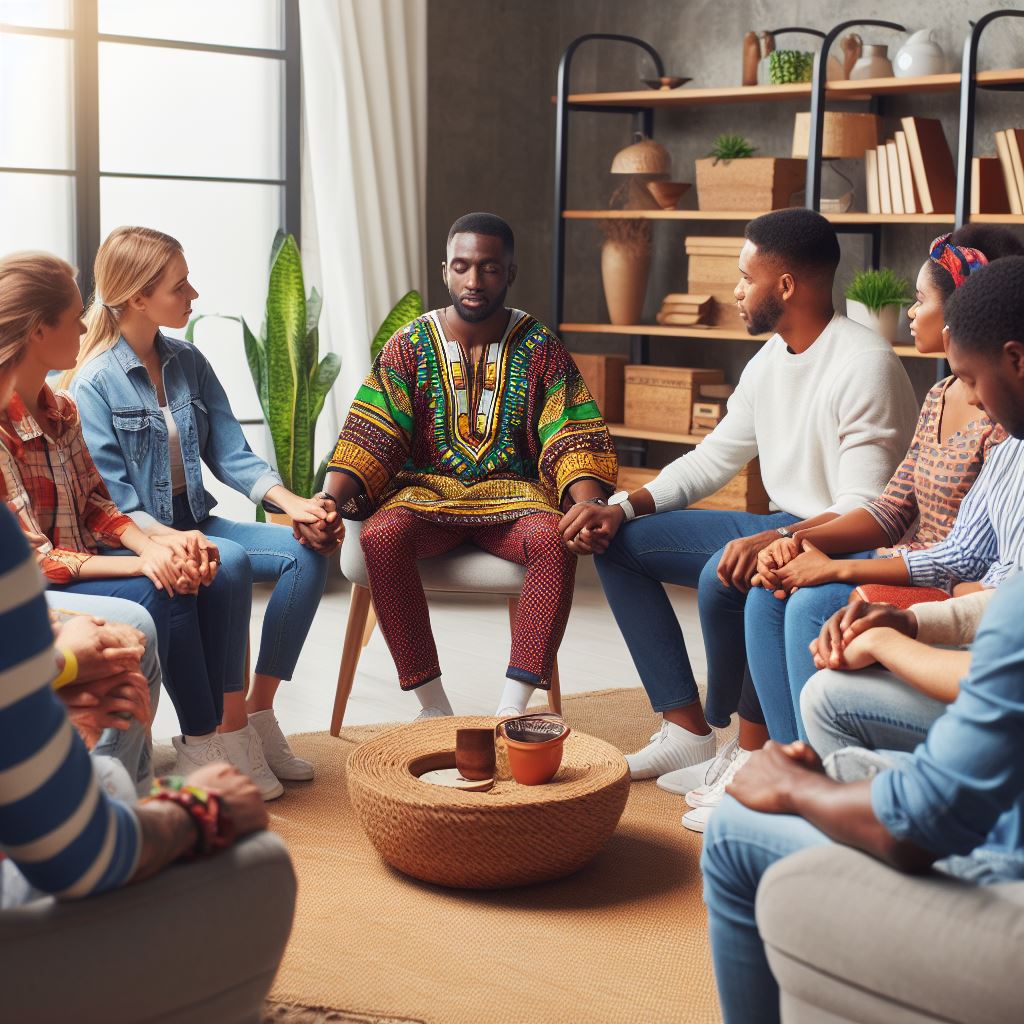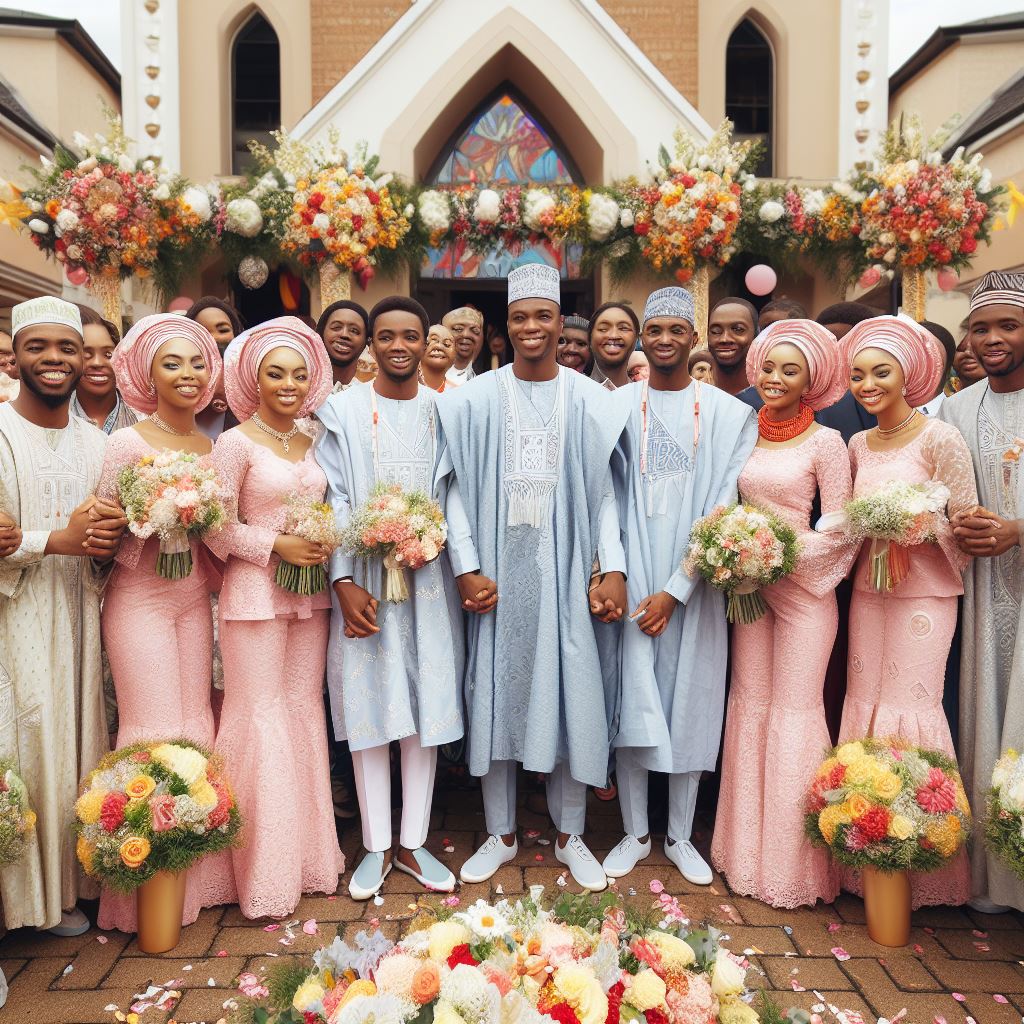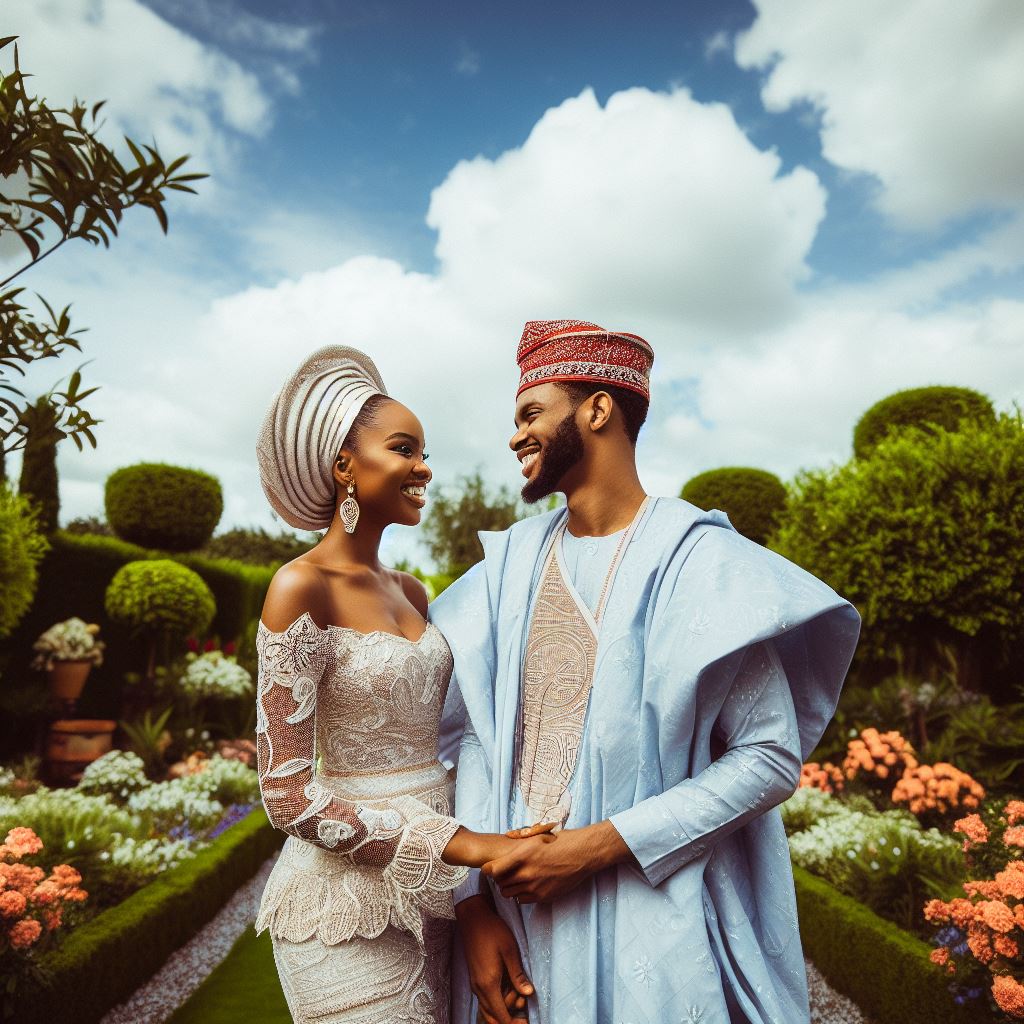Introduction
Marriage life in Nigeria is a crucial aspect that profoundly impacts society and individuals.
Having a harmonious relationship is vital for a successful marital bond, ensuring happiness, stability, and personal growth.
This blog post aims to provide valuable tips for achieving harmony in a Nigerian marriage, promoting healthier relationships and overall well-being for couples.
Introduction to Marriage Life in Nigeria
- Cultural Tapestry: Marriage in Nigeria weaves a rich tapestry, blending tradition, family, and shared values.
- Diverse Dynamics: From urban centers to rural landscapes, marital dynamics in Nigeria are diverse.
Importance of Harmony in Marital Relationships:
- Foundation of Stability: Harmony forms the bedrock, ensuring stability and resilience in the face of challenges.
- Family Unit Strength: A harmonious marriage is the cornerstone for a strong and thriving family unit.
- Cultural Significance: In Nigerian culture, harmonious marriages are not just personal victories but community assets.
Objective of the Blog Post:
- Guidance for Couples: This blog post aims to provide practical tips for Nigerian couples to cultivate harmonious marriages.
- Cultural Insights: Explore how cultural nuances impact marital harmony in Nigeria, offering a nuanced understanding.
- Building Resilience: Share insights on fostering resilience in marital relationships, crucial for navigating the complexities of life together.
- Community Connection: Illustrate how harmonious marriages contribute to the fabric of Nigerian communities, embodying shared values and mutual support.
Understanding Nigerian Cultural Aspects of Marriage
1. Explore the traditional practices and customs associated with Nigerian weddings
Marriage is a sacred institution in Nigeria, and weddings are elaborate affairs that showcase the rich cultural heritage of the country.
In Nigeria, weddings are not just a union between two individuals but also a coming together of families and communities.
The traditional practices and customs associated with Nigerian weddings vary across the different ethnic groups in the country.
These customs often include pre-wedding ceremonies, such as introduction, bride price payment, engagement, and traditional marriage rites.
2. Discuss the role of family and extended relatives in Nigerian marriages
In Nigerian culture, marriage is seen as a union between families rather than just two individuals.
Family plays a significant role in Nigerian marriages, and the decisions regarding marriage are not solely made by the bride and groom.
Extended relatives, especially parents and elders, are deeply involved in the process of finding a suitable partner and negotiating the terms of the marriage.
This involvement helps to ensure that the couple receives the support and guidance needed for a successful and harmonious married life.
Highlight the significance of cultural and religious traditions in maintaining harmony
Cultural and religious traditions hold immense importance in Nigerian marriages as they play a vital role in maintaining harmony within the family and community.
These traditions provide a framework for the couple to navigate and understand their roles and responsibilities in the marriage.
They also offer a sense of belonging and identity, fostering a strong bond between the couple and their cultural and religious roots.
Cultural practices such as respect for elders, communal living, and sharing of responsibilities contribute to the overall harmony and stability of Nigerian marriages.
In fact, understanding the Nigerian cultural aspects of marriage is crucial for harmonious living in Nigeria.
Exploring the traditional practices and customs associated with Nigerian weddings, recognizing the role of family and extended relatives, and acknowledging the significance of cultural and religious traditions are key to maintaining a strong and successful marriage in Nigeria.
Effective Communication
1. Emphasize the importance of open and honest communication in a marriage
Open and honest communication is the foundation of a strong marriage. It fosters trust, understanding, and mutual respect between partners.
It allows couples to express their thoughts, feelings, and needs in a healthy and constructive manner.
2. Discuss ways to improve communication skills between partners
In order to improve communication skills, couples can start by actively listening to each other.
This means giving full attention to what the other person is saying without interrupting or making assumptions.
They can also practice empathy and try to understand each other’s perspectives.
Additionally, using “I” statements instead of blaming or criticizing can foster better communication.
Address common communication challenges in Nigeria and provide strategies to overcome them
One common communication challenge in Nigeria is the use of indirect communication.
In many cases, people tend to rely on non-verbal cues or assume that their partner knows what they want without explicitly stating it.
This can lead to misunderstandings and frustration. To overcome this, couples can make a conscious effort to communicate openly and clearly.
They can use words to express their thoughts and desires, avoiding assumptions.
Additionally, seeking professional help, such as couple’s therapy, can provide tools and strategies to improve communication in a marriage.
List of common communication challenges in Nigeria
- Indirect communication
- Assuming your partner knows what you want
- Failure to actively listen
- Using blame or criticism instead of expressing needs
- Lack of empathy towards each other’s perspectives
Strategies to overcome communication challenges
- Practice open and direct communication
- Be clear about your expectations and desires
- Listen actively and without interruption
- Use “I” statements to express your needs
- Show empathy and try to understand your partner’s point of view
- Consider seeking professional help, such as couple’s therapy
Effective communication is crucial for a harmonious marriage. It allows couples to connect on a deeper level, resolve conflicts, and navigate through the challenges of married life in Nigeria.
By emphasizing the importance of open and honest communication, discussing ways to improve communication skills, and addressing common challenges, couples can cultivate a strong and healthy relationship based on understanding and mutual respect.
Resolving Conflicts
Conflicts are unavoidable in any relationship as individuals have different perspectives and preferences.
- Open communication is vital for resolving conflicts in a healthy and respectful manner.
- Listening attentively to each other’s concerns and opinions can lead to better understanding.
- Acknowledge the emotions of your partner and validate their feelings to create a safe space for resolution.
- Avoid blaming or criticizing each other during conflict discussions.
- Focus on the issue at hand instead of bringing up past mistakes or unrelated matters.
- Identify the root cause of the conflict and address it rather than just dealing with the surface-level disagreements.
- Be willing to compromise and find common ground that satisfies both partners.
- Seek professional help, such as couples therapy, when necessary to improve conflict resolution skills.
- In Nigeria, cultural and gender dynamics can influence conflict resolution in marriage.
- Traditional norms may place more emphasis on male dominance, making it challenging for women to express themselves.
- Both partners need to actively work towards dismantling gender stereotypes and promoting equality in conflict resolution.
- Respecting each other’s cultural values and traditions is crucial for a harmonious conflict resolution process.
- Recognize that conflicts may arise due to cultural differences and strive to find a balance between individual and cultural expectations.
- Encourage open dialogue about cultural practices and beliefs to gain a deeper understanding of each other’s perspectives.
- Involve family elders or trusted individuals, following Nigerian customs, to mediate conflicts when necessary.
- Remember that effective conflict resolution requires patience, empathy, and a willingness to learn and grow together.
- Practice active listening, where you give your full attention and show genuine interest in your partner’s viewpoint.
- Use “I” statements to express your feelings and avoid sounding accusatory or confrontational.
- Take breaks when conflicts become overwhelming, allowing both partners to cool down before continuing the conversation.
- Remember that conflicts can be opportunities for growth, strengthening the bond between partners when resolved effectively.
In short, conflicts are natural in any marriage, but they can be resolved through healthy communication, empathy, and respect for each other’s perspectives and cultural dynamics.
Gender Roles and Expectations
In Nigerian marriages, traditional gender roles have played a significant role in shaping the dynamics of relationships.
Men are often expected to be the breadwinners and decision-makers, while women are expected to be submissive and take care of the home.
This distribution of roles has created a power imbalance, as men often hold the authority and final say in important matters.
However, the emergence of discussions around gender equality has gradually challenged these traditional expectations.
The impact of gender equality on marital harmony in Nigeria has been profound. It has led to a shift in power dynamics and a more balanced partnership.
Women are now empowered to pursue their education and careers, contributing to the financial stability of the family.
Additionally, the recognition of women’s rights and the importance of their opinions have fostered stronger communication within marriages.
Couples now have more open discussions and make joint decisions, resulting in increased understanding and harmony.
Suggestions for Creating a Balanced Partnership
While challenging traditional gender roles can lead to progress, it is essential to consider Nigerian societal norms in order to maintain harmony within the marriage.
Here are some suggestions:
1. Communication Is Key
- Encourage open and honest communication to foster understanding and mutual respect.
- Discuss expectations, concerns, and aspirations to align goals and desires.
- Listen actively to each other’s opinions and validate each other’s feelings.
2. Embrace Shared Responsibility
- Acknowledge and appreciate each other’s contributions to the relationship.
- Share household chores and childcare responsibilities equally.
- Create a fair division of labor that suits both partners’ abilities and interests.
3. Respect Each Other’s Autonomy
- Recognize and support each other’s individual goals and personal growth.
- Encourage independence and provide space for personal hobbies and interests.
- Avoid controlling behaviors and allow each other to make autonomous decisions.
4. Challenge Gender Stereotypes
- Question societal norms and expectations that reinforce gender inequalities.
- Promote equal opportunities for education, career advancements, and personal development.
- Support each other’s ambitions and aspirations, regardless of traditional gender roles.
5. Seek Professional Help if Needed
- If conflicts and challenges persist, consider seeking the guidance of counselors or therapists.
- Professional help can provide valuable insights and strategies for resolving issues.
- Do not hesitate to ask for assistance in building a harmonious and fulfilling marriage.
In general, Nigerian marriages have traditionally revolved around distinct gender roles and expectations.
However, as discussions around gender equality gain momentum, there is a need for a balanced partnership within societal norms.
By promoting open communication, shared responsibility, respect for autonomy, challenging stereotypes, and seeking professional help when necessary, couples can pave the way for a harmonious and fulfilling marriage.
Read: Harmonizing Love and Faith: Nigerian Couple’s Anniversary Prayer Rituals

Financial Management in Marriage
Financial stability is crucial for a harmonious and successful marriage in Nigeria.
Money matters can often become a significant source of tension and conflicts between couples.
Therefore, effective financial planning, budgeting, and shared responsibility are essential for a stable and fulfilling marital life.
Significance of Financial Stability
Financial stability plays a vital role in creating a strong foundation for a successful marriage.
It ensures a sense of security and provides the necessary resources to meet basic needs and aspirations.
Here are some reasons why financial stability is significant:
- Open Communication: Financial stability encourages open and transparent communication between spouses, leading to better understanding and trust.
- Reduces Stress: Money worries can cause immense stress. Financial stability alleviates anxiety and allows couples to focus on building a healthy relationship.
- Peaceful Environment: With financial stability, couples can create a peaceful home environment and provide a secure future for themselves and their children.
- Long-Term Goals: Financial stability enables spouses to plan and work towards common long-term goals, such as buying a house, starting a family, or retiring comfortably.
Common Financial Challenges
Couples in Nigeria often face various financial challenges that can strain their marriage.
Awareness of these challenges is essential to address them effectively.
Here are some common financial challenges faced by couples:
- Income Disparities: Differences in earning capacities can lead to power imbalances and conflicts regarding financial decision-making.
- Debt Burden: Accumulated debts, such as loans and credit card bills, can create financial strain and hinder couples from achieving their goals.
- Unplanned Expenses: Unexpected expenses, such as medical emergencies or home repairs, can disrupt financial stability and put a strain on the relationship.
- Conflicting Financial Values: Different spending habits, saving priorities, or attitudes towards money can create conflicts and misunderstandings.
Tips for Effective Financial Management
With proactive financial planning and shared responsibility, couples can overcome financial challenges and promote harmony in their marriage.
Here are some essential tips:
- Open Dialogue: Regularly discuss financial matters, set goals together, and make joint financial decisions.
- Create a Budget: Develop a comprehensive budget that outlines income, expenses, and savings goals. Stick to the budget as much as possible.
- Emergency Fund: Set aside a portion of your income as an emergency fund to tackle unforeseen expenses.
- Debt Management: Work together to reduce and manage debts. Prioritize payments and consider consolidation or seeking professional help if needed.
- Shared Responsibilities: Divide financial responsibilities based on each partner’s strengths and interests. This promotes a sense of fairness and shared commitment.
- Saving for the Future: Save for retirement, children’s education, or any other long-term goals. Consider investment opportunities to grow your wealth.
- Seek Professional Advice: If needed, consult with financial advisors or marriage counselors who can provide guidance on effective financial management.
By implementing these tips, couples can build a solid financial foundation, reduce conflicts, and work towards a prosperous and harmonious marriage in Nigeria.
Read: How Religion Impacts Marriage Counseling in Nigeria
Delve into the Subject: Modern vs Traditional: Changing Nigerian Marriage Tales
Delve into the Subject: A Mother’s Prayer: Seeking God’s Protection for Her Married Child
Maintaining Individuality in Marriage
Marriage is a beautiful union of two individuals who come together to share their lives, dreams, and aspirations.
As much as it is essential to build a strong bond as a couple, it is equally important to maintain individuality within a marriage.
Recognizing and nurturing one’s personal identity is crucial for a harmonious and fulfilling married life.
Here, we discuss the importance of maintaining individuality and the challenges faced by married individuals in Nigeria regarding personal aspirations.
The Importance of Maintaining Individuality
In a marriage, it is natural for both partners to merge their lives, making decisions together and sharing responsibilities.
However, losing sight of one’s individual identity can lead to a sense of loss and frustration.
Maintaining individuality allows each partner to have a sense of self and independence, which contributes to personal growth and fulfillment.
Challenges Faced by Married Individuals in Nigeria
- Societal Expectations: Nigerian society often emphasizes the role of marriage and family, placing great importance on collective decisions over individual aspirations.
- Gender Roles: Traditional gender roles within Nigerian marriages can limit personal aspirations, particularly for women, who may face pressure to prioritize their family over personal growth.
- Financial Constraints: Limited resources and financial obligations can hinder personal development and limit opportunities for pursuing individual passions.
- Time Management: Balancing personal interests with marital responsibilities can be challenging, especially when both partners have demanding careers or other obligations.
Suggestions for Supporting Personal Growth
While being married, it is possible to maintain personal growth and fulfillment by following these suggestions:
- Open Communication: Discuss personal aspirations and goals with your spouse, ensuring that both partners understand and support each other’s individual dreams.
- Encourage Hobbies and Interests: Create space and time for pursuing individual interests, allowing each partner to develop their skills and talents.
- Set Achievable Goals: Define individual goals and work towards them together, breaking them down into smaller achievable steps that can be managed within the constraints of married life.
- Support System: Surround yourself with a support system that includes like-minded individuals who understand and encourage personal growth.
- Time Management: Effectively manage time by prioritizing both marital responsibilities and personal pursuits, creating a schedule that allows for a healthy balance.
- Continuous Learning: Never stop learning and growing individually. Seek opportunities for personal development through courses, workshops, or self-study.
By incorporating these suggestions into married life, couples can maintain a harmonious relationship while fostering personal growth and fulfillment.
In review, maintaining individuality within a marriage is crucial for a harmonious and fulfilling life.
It allows individuals to pursue personal aspirations and goals while still nurturing the bond between partners.
Nigerian married individuals face various challenges in maintaining their individuality, but with open communication, support, and effective time management, personal growth and fulfillment can be achieved.
Remember, a strong and mutually supportive marital relationship can coexist with the pursuit of personal ambitions.
Read: Cost of Marriage Counseling in Nigeria: Budgeting for Harmony
Learn More: Promises for Couples: Inspirational Bible Verses
The Role of In-Laws in Nigerian Marriages
In traditional Nigerian society, the role of in-laws is highly significant and holds a great deal of influence over marriages.
In-laws are considered an integral part of the family unit and their involvement in the lives of newlyweds is expected.
However, navigating this relationship can sometimes be challenging.
Here, we will discuss the role of in-laws in Nigerian marriages, the common challenges faced, and provide tips for building a healthy and harmonious relationship with in-laws.
1. The Role of In-Laws
In Nigerian marriages, in-laws play a crucial role in providing support, guidance, and stability to newlyweds.
They are seen as an extension of the immediate family and are responsible for ensuring the success and happiness of the new couple.
In-laws hold a position of authority and are often consulted for important decisions.
2. Common Challenges
Despite the importance of in-laws, dealing with them can often be challenging.
Cultural differences, differing expectations, and interference in personal matters are common challenges faced by couples.
In certain cases, in-laws may try to exert control over the couple, leading to conflicts and strains in the relationship.
3. Tips for Building a Healthy Relationship
To maintain a healthy relationship with in-laws, couples need to establish clear boundaries while respecting and valuing the importance of their role.
Here are some tips to navigate this relationship with harmony:
- Communicate openly: Effective communication is crucial. Express your feelings, concerns, and expectations in a respectful manner, fostering understanding and empathy.
- Set boundaries: Establishing boundaries is essential to maintain a healthy relationship. Discuss and agree upon what is acceptable and what crosses the line, ensuring everyone’s comfort.
- Respect cultural differences: Nigeria is a diverse country with various ethnicities and traditions. Embrace and appreciate the differences, while finding common ground to bridge any gaps.
- Support your spouse: Always prioritize your spouse’s feelings and needs. Show solidarity and unity, making it clear you are each other’s main priority.
- Seek compromise: In-laws may have different opinions and ideas. Seek compromise and find a middle ground, respecting everyone’s perspectives.
- Maintain your independence: While in-laws contribute significantly, it is important for couples to maintain their independence and make decisions that are best for their marriage.
- Seek external help if needed: If conflicts persist and communication breaks down, consider seeking professional counseling or mediation to facilitate a healthy resolution.
In-laws play a significant role in Nigerian marriages, providing support and guidance to the couple. However, challenges may arise due to cultural differences and interference.
By effectively communicating, setting boundaries, and respecting each other’s perspectives, couples can build a healthy and harmonious relationship with their in-laws.
Remember, a strong foundation based on love, respect, and understanding will contribute to a successful and fulfilling marriage in Nigeria.
Read: Understanding the Dynamics of Marriage Life in Nigeria
Conclusion
The importance of harmonious living in Nigerian marriages cannot be overstated.
By implementing the tips provided in this blog post, couples can ensure a successful and fulfilling marriage life.
Throughout the blog post, we discussed the significance of effective communication, mutual understanding, and compromise in a marriage.
We emphasized the importance of respect, trust, and support in nurturing a healthy marriage relationship.
It is crucial for couples to prioritize spending quality time together, maintaining a balance between personal and marital life.
We highlighted the role of forgiveness, patience, and resilience in overcoming challenges that may arise in marriage.
By implementing these tips, couples can foster a harmonious environment within their marriages, which will lead to stronger bonds and increased happiness.
It is essential for spouses to prioritize their relationship and work together to build a fulfilling future.
In the end, a harmonious marriage is a key to a happy and successful life. With open minds and hearts, couples can navigate any hurdles and build a fulfilling life together in Nigeria.




